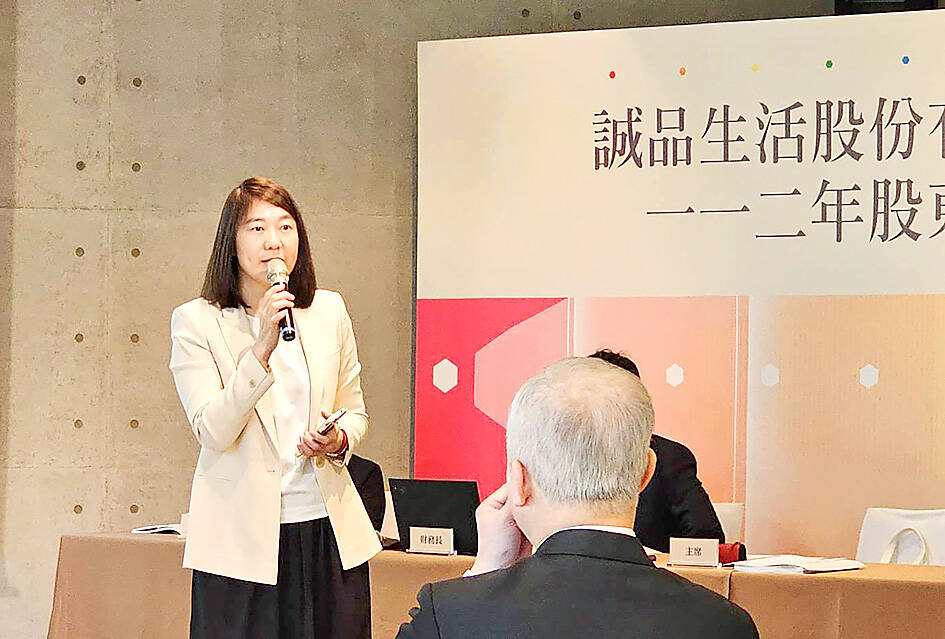Eslite Spectrum Corp (誠品生活) yesterday said that its e-commerce business would remain unprofitable and drag on the group’s financial performance for another three to four years until it reaches an optimal scale.
Eslite Spectrum chairwoman Mercy Wu (吳旻潔) made the remarks during a shareholders’ meeting, where she said the online operation was to blame for the company’s losses of NT$188 million (US$6.13 million) last year, or a loss per share of NT$3.97.
The company, which operates the Eslite bookstore chain, department stores, and leisure lifestyle services in Taiwan and abroad, sought to tap into the e-commerce business during the COVID-19 pandemic and spent large sums on personnel and equipment, as well as warehousing and logistics facilities, Wu said.

Photo: CNA
The endeavor added 100 employees to the payroll and might not turn profitable before the economic scale grows large enough, she said.
The conglomerate would swing to a profit soon, as brick-and-mortar stores at home and abroad rapidly emerge from the pandemic, she added.
Eslite Spectrum squeezed a net profit of NT$0.18 per share in the fourth quarter of last year, but incurred a loss of NT$0.45 per share in the first quarter of this year, company data showed.
Online members have increased to 30 percent of overall customers, while logistics facilities could generate up to NT$10 billion in revenue, showing the investment is worthwhile, Wu said.
To speed up the return to profitability, Eslite Spectrum yesterday appointed former minister of economic affairs Chang Chia-juch (張家祝), property consultancy veteran Tony Chao (趙正義) and e-commerce expert Jimmy Yu (游士逸) to its board.

Intel Corp chief executive officer Lip-Bu Tan (陳立武) is expected to meet with Taiwanese suppliers next month in conjunction with the opening of the Computex Taipei trade show, supply chain sources said on Monday. The visit, the first for Tan to Taiwan since assuming his new post last month, would be aimed at enhancing Intel’s ties with suppliers in Taiwan as he attempts to help turn around the struggling US chipmaker, the sources said. Tan is to hold a banquet to celebrate Intel’s 40-year presence in Taiwan before Computex opens on May 20 and invite dozens of Taiwanese suppliers to exchange views

Application-specific integrated circuit designer Faraday Technology Corp (智原) yesterday said that although revenue this quarter would decline 30 percent from last quarter, it retained its full-year forecast of revenue growth of 100 percent. The company attributed the quarterly drop to a slowdown in customers’ production of chips using Faraday’s advanced packaging technology. The company is still confident about its revenue growth this year, given its strong “design-win” — or the projects it won to help customers design their chips, Faraday president Steve Wang (王國雍) told an online earnings conference. “The design-win this year is better than we expected. We believe we will win

Power supply and electronic components maker Delta Electronics Inc (台達電) yesterday said it plans to ship its new 1 megawatt charging systems for electric trucks and buses in the first half of next year at the earliest. The new charging piles, which deliver up to 1 megawatt of charging power, are designed for heavy-duty electric vehicles, and support a maximum current of 1,500 amperes and output of 1,250 volts, Delta said in a news release. “If everything goes smoothly, we could begin shipping those new charging systems as early as in the first half of next year,” a company official said. The new

Quanta Computer Inc (廣達) chairman Barry Lam (林百里) is expected to share his views about the artificial intelligence (AI) industry’s prospects during his speech at the company’s 37th anniversary ceremony, as AI servers have become a new growth engine for the equipment manufacturing service provider. Lam’s speech is much anticipated, as Quanta has risen as one of the world’s major AI server suppliers. The company reported a 30 percent year-on-year growth in consolidated revenue to NT$1.41 trillion (US$43.35 billion) last year, thanks to fast-growing demand for servers, especially those with AI capabilities. The company told investors in November last year that